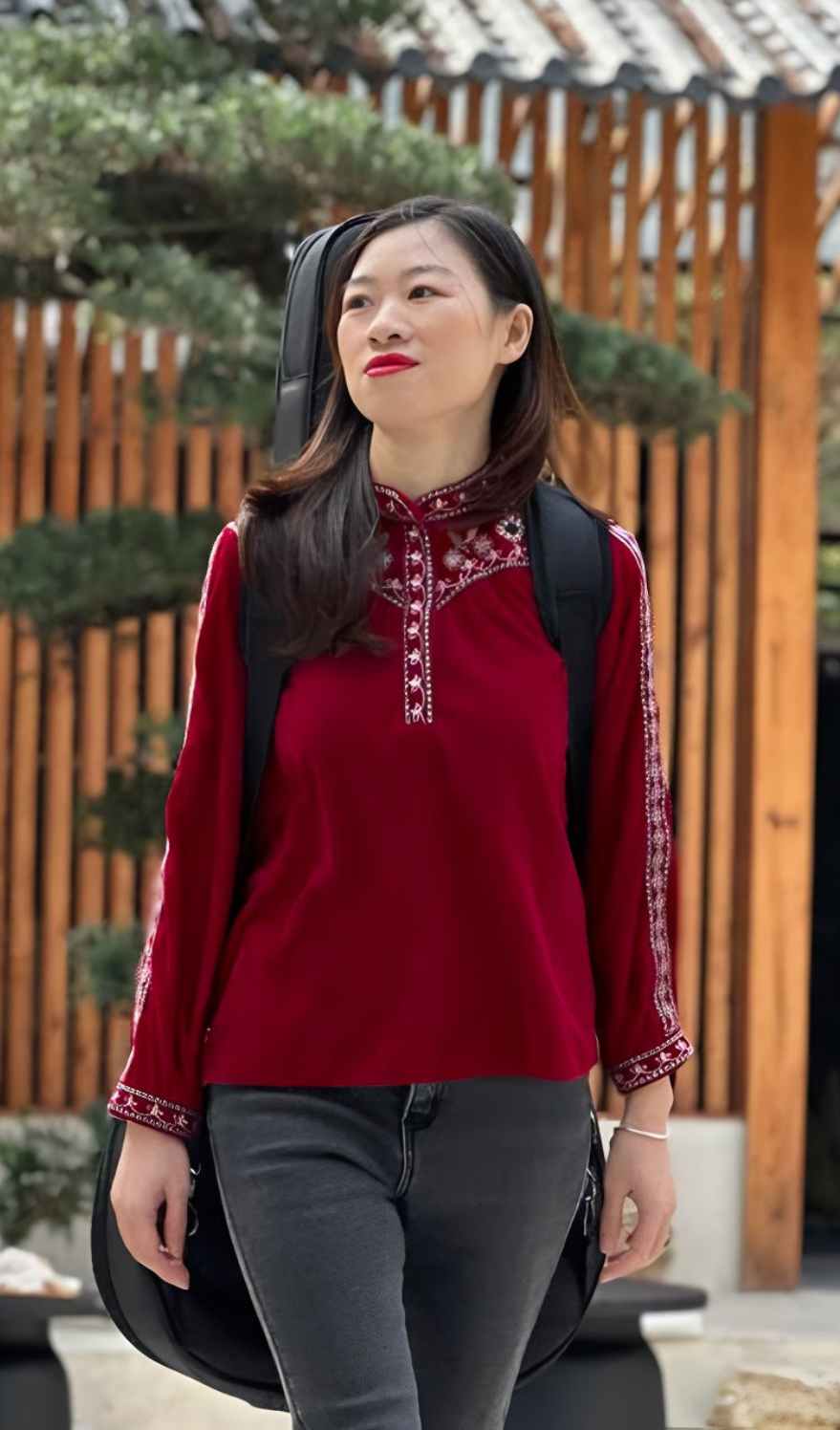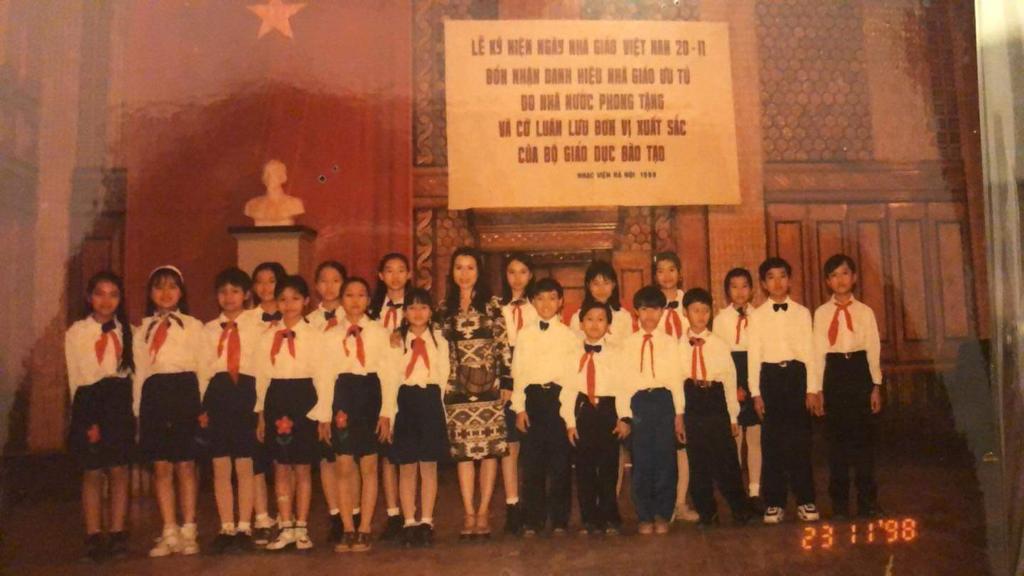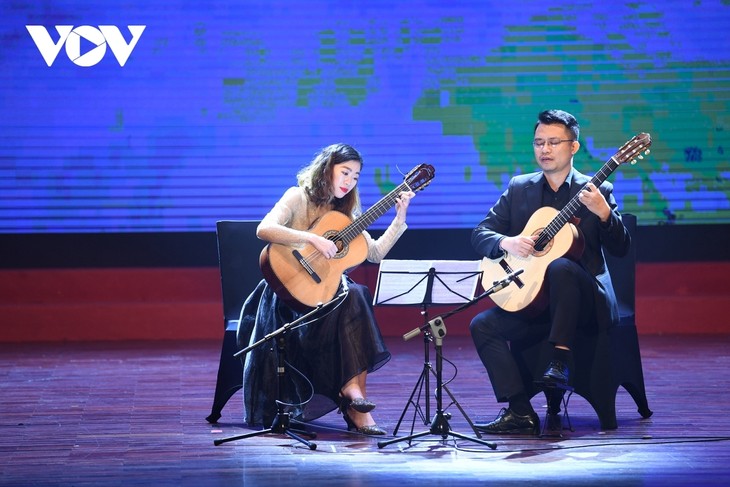People say that the guitar is like a mini orchestra, and I believe that’s true. But you have to listen to what an orchestra sounds like in order to make your guitar sound like one. She has big dreams – as a classical guitarist and for the classical guitar.
Thang Thi Bich Hang hails from Hanoi, Vietnam. She teaches classical guitar and performs in Vietnam, too. Miss Thang, as she is known to her students, or Hang, as her friends call her, hopes to become an international concert guitarist soon. She also hopes that one day, the guitar will be the first instrument that comes to mind when orchestral conductors, concert producers and impresarios have to stage a concert. “My aim is to become an international guitarist,” the 30-something states boldly. For that, she knows that she needs to practise hard at her craft to become a better musician. She currently performs three to five concerts a year as a soloist or in an ensemble, and plays in monthly friendship concerts which promote the classical guitar. She feels that if more people would listen to the classical guitar, the instrument would rise in eminence. For that to happen, exponents of the classical guitar need to be extremely well-practised for their artistry to be heard far and wide. And that would, of course, require plenty of practice. And practising is not something she is unfamiliar with – she has been hard at it since she was a child. Hang was introduced to the classical guitar by a classmate in a new primary school she moved to. “We became close friends after I met her in this new primary school and at her suggestion, I picked up the guitar. We would practise together in a local studio,” says Hang. Her potential was clearly evident as her mother sent her to a professional guitar instructor shortly after that, and she made an instant connection with her new music teacher. “I don’t know why, but I could feel her sensitivity towards me with her music,” says Hang. In the year that followed, 10-year-old Hang attained a level of proficiency that saw her clearing the entrance exam to the Hanoi National Conservatory of Music (now called the Vietnam National Academy of Music), wherein she would spend the next 13 years of her life – five years at primary level, four years at intermediate level and another four years for her bachelors programme after which she graduated with a degree in performance. She went on to get a diploma in teaching, too. “Almost all of my childhood memories are connected to music, and of course, the classical guitar,” says Hang, who considers herself fortunate to have been able to enter the conservatory at such a young age – the academy no longer takes in such young students. She had access to all the time and teaching to develop her skills as a guitarist. “We practised every day, for about three to four hours each day, and five to six hours when it got nearer to the exams,” explains Hang. “My parents gave me everything I needed – a studio, time and education.” CONSERVATORY LIFE She says that her life in the conservatory reminds her of the book, Le Petit Nicolas by Rene Gosciny. “I studied for a long time there, so our teachers practically became our family. They were encouraging, which motivated me to keep practising. Also, I was worried I’d be seen as lazy if I did not practise enough!” However, it was not all fun and games for the young students in the conservatory. “We were under a lot of pressure to do well, too. I recall one of my friends crying on stage in one test. You know, you’re only 8 or 9 or 10 years old, and you have to perform a piece to perfection in the presence of so many professors and musicians – we were all so frightened,” says Hang. It was this fear of being anything less than perfect that made her “practise, practise and practise”, says Hang. “Now, when people ask why I’m not at all nervous on stage, I only give them a smile,” she adds. It was not a dreary life of merely practising, though, says Hang. While in the conservatory, she had plenty of opportunity to watch and learn from many other musicians and professors, and not just classical guitarists, too. “There were students and teachers of strings, piano, percussion and woodwind, too, so we got to experience the music of different instruments, and how these players performed in the concert theatre,” explains Hang. She recalls: “When I was a student, I used to listen to big name guitarists such as John William, Julian Bream and Duo Assad – their music is awe-inspiring, and till now, they remain my idols. But as time passed, I’ve seen many wonderful guitarists emerging, the notable ones being Xuefei Yang (China), Bokyung Byun (South Korean), Alexandra Whittingham (England) and Haruna Miyagawa (Japan)." CLASSICAL MUSIC – AND THE GUITAR
But for her, it was always the classical guitar and she never once considered switching from her first love. She feels it is easy for her to understand why she has chosen to be a classical guitarist, but confesses it is not easy for her to explain why. “I have followed the path of a classical guitarist since I was a child. I have also had the time and opportunity to observe and explore many other styles of music. But I’ve always felt better about classical music – it is the type of music that I can best express myself as well as excel in,” says Hang. She feels that learning classical music is important, and that the classical guitar is a wonderful instrument to learn music with. “We all know, through well-documented research, the benefits of music education to children, young people and even older people. Even foetuses experience the benefits when their pregnant mothers listen to classical music,” says Hang. “Let people learn classical music naturally,” she urges. And naturally for her, she believes the guitar – one of the world’s most-played musical instruments – has an advantage over other instruments because music is made through the direct touch of the musician on the guitar’s strings. “You create sound with a guitar by directly pressing on a guitar’s strings with one hand and plucking the strings with the other. The music comes from your fingertips – it is the best way to display our musical emotion and tone colours. “Practising the classical guitar helps in brain development, emotional satisfaction, and motor skills. Also, with the guitar, people can do many styles of music – apart from being a soloist, you can play in an ensemble, you can perform in a band that plays electronic music, you can accompany a vocalist or you can play and sing yourself, and you can have fun with other instrumentalists, too. And the guitar is very portable, too – people can go anywhere with a guitar on their shoulder.” She is of the view that anyone starting to play the guitar should start with the classical guitar as the technique is the basic model for all beginners. “The beginner would also eventually reach the highest level of that art form when they play the classic works. But start with the basics, and take it step by step. Persevere, even if you have to do it slowly,” she advises. And persevere is what she did, prevailing as a classical guitarist. Nowadays, she practises three to four hours daily, from morning till noon. “My routine is left-right hand exercises, scales, review of some works, then study new works, too. I think self-practice is the most important thing for a guitarist,” she says. She practises to become a better musician – learning new repertoire so she can develop new programmes for concerts. She performs three to five classical concerts a year with a group of classical musicians. “I perform as a solo guitarist and also in a duo or trio with other instruments. There are places in Hanoi which offer opportunities for guitarists to perform, and I practise so that I can deliver a more professional show and to work on new programmes,” she explains. Hang is also a regular feature at friendship concerts – monthly public performances that are sponsored by makers of musical instruments to promote the classical guitar. She feels practising is important for her as a guitar instructor, too, as it helps her connect with musicians more effectively.
HER GUITARS Hang used to play a Japanese guitar. It was a copy of Andres Segovia’s instrument with a long scale of 664 mm and a 53.4 mm nut width. “It was a gift from a group of visiting Japanese guitarists who came to watch my concert in Hanoi many years ago,” she says. But she found the guitar a little too large for her dainty fingers and now plays a Picado C1 Concierto. “It is a double-top guitar which has a brilliant tone and power. It is also rich in tonal colours. This instrument is better for me when I play in concerts, especially with other instruments. The volume (or the lack thereof) of a classical guitar is always a problem when the guitar goes together with other instruments, especially as I do not use amplification in my concerts. I believe the unamplified tone of the guitar provides audiences with the highest quality of sound. It is the best way for the audience to understand your performance.” She has also played on other guitars, and the ones that have impressed her are the Sakurai Professional J, Hanika double-top and Fleta. “Those were very impressive, with their deep tone and harmonic in different ways. Sakurai’s guitar seems to have a sweet sound and balance between bass and treble, Hanika has clean sound and power and Fleta’s sound seems to bring me to the past because of its depth. When I touch the Fleta, I want to play sweet music.” “Teaching guitar to people of all ages helps me understand what I have to do and what I should do – building and connecting classical musicians in different instruments to guitar players and to people who love classical music. I also have a YouTube channel where I post my music. I’m sure that when guitarists play well, their music would touch the audience’s heart,” says the guitar instructor who teaches mostly individual classes, and online, too. For her, it’s important to practise before a performance, though that isn’t the only thing that concerns her before a show. “There are many things to do before each concert – choosing the music, arranging the sequence of the pieces, and then practising these to perfection, reading about the composer and the music for greater knowledge and context, and listening to the interpretations of other musicians. “I also need to choose which strings to use and of course, worry about what to wear when I am on stage,” adds the performer who has performed as a soloist and in guitar duos, trios and quartets as well as with many other instruments. “As a guitarist, I hope to get more chances to play the classical guitar and allow my music to resonate with audiences the way the guitar resonates with me,” says Hang. "For me, every performance is wonderful – I always have a lot of emotions on stage. For performing artists like me, being able to go on stage, playing the pieces that I have practised so hard, and expressing myself in front of an audience is what makes me happy. These are the most wonderful moments for me," says Hang. Besides practising, Hang believes it is also important to listen to other instruments, especially orchestral music like the great symphonies. “People say that the guitar is like a mini orchestra, and I believe that’s true. But you have to listen to what an orchestra sounds like in order to make your guitar sound like one,” Hang says. The guitarist, aside from classical music, listens to multiple genres, especially jazz, which she likes. She also enjoys opera and all the composers who have written for it. As for her favourite composers for the classical guitar, she counts Francisco Tarrega, Isaac Albeniz, Joaquin Rodrigo, Federico Moreno Torroba and Agustin Barrios because of their harmonies and melodies. “I also love modern works such as those by Roland Dyens, Paulo Bellinati, Carlo Domeniconi and Leo Brouwer. I’m playing their music now,” she says. “I’m also interested in J.S. Bach’s music, too. I’m attracted to it because of its polyphonic nature as well as the structure and segmentation of music. “However, for my repertoire, I prefer to choose music from Spanish composers. I feel that their music seems to be the best for the guitar.” Which is why she chooses mainly from the Spanish classics when programming her concerts, which are usually held in Hanoi, where she is based. But she hopes someday to play at a venue near you, if you’re not already in Hanoi. “I have played here in solo concerts, community concerts and friendship concerts. I hope to play in other cities and in other countries.” And it is her hope that her endeavours would also create a bigger audience for the classical guitar. “I hope that one day, the classical guitar will be the first instrument that comes to mind for conductors and producers whenever a concert is being organised,” says Hang. |
YOU MAY LIKE
|
OPEN STUDIO
The Classical Guitar Life A 45-minute showcase followed by a short talk + discussion on how the guitar can be a rewarding hobby. Includes explaining matters such as changing strings, guitar cost and maintenance. This programme is suitable for those interested in the classical guitar, including young adults. Registration opens now. |




